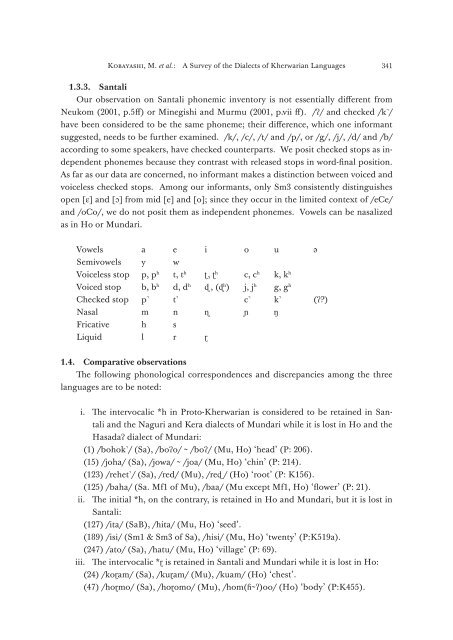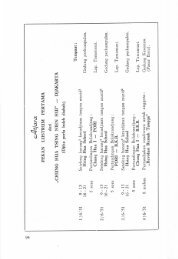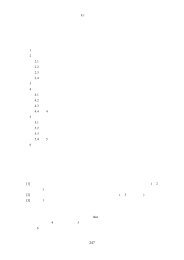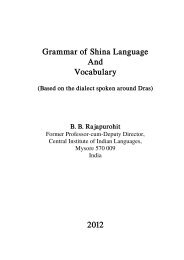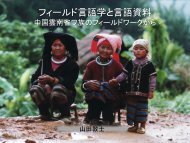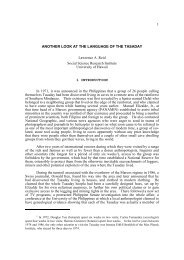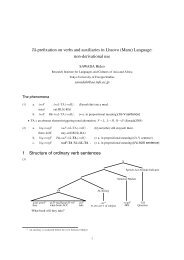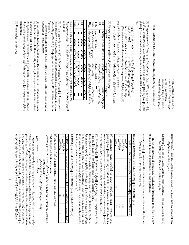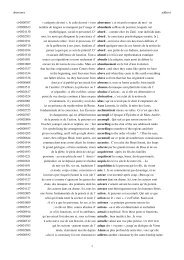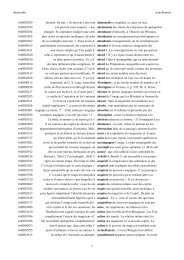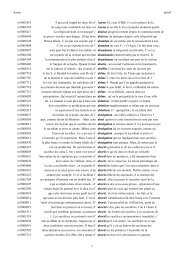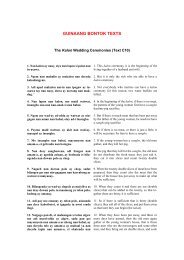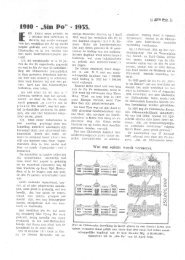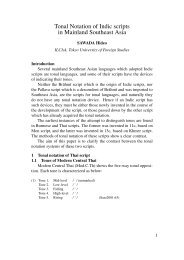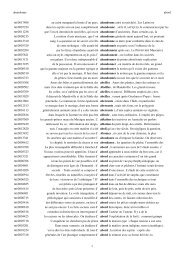ç® æ¬¡ - æ±äº¬å¤å½èªå¤§å¦ã¢ã¸ã¢ã»ã¢ããªã«è¨èªæåç 究æ
ç® æ¬¡ - æ±äº¬å¤å½èªå¤§å¦ã¢ã¸ã¢ã»ã¢ããªã«è¨èªæåç 究æ
ç® æ¬¡ - æ±äº¬å¤å½èªå¤§å¦ã¢ã¸ã¢ã»ã¢ããªã«è¨èªæåç 究æ
You also want an ePaper? Increase the reach of your titles
YUMPU automatically turns print PDFs into web optimized ePapers that Google loves.
K, M. et al.: A Survey of the Dialects of Kherwarian Languages<br />
<br />
... Santali<br />
Our observation on Santali phonemic inventory is not essentially different from<br />
Neukom (, p.ff) or Minegishi and Murmu (, p.vii ff). // and checked /k/<br />
have been considered to be the same phoneme; their difference, which one informant<br />
suggested, needs to be further examined. /k/, /c/, /t/ and /p/, or /g/, /j/, /d/ and /b/<br />
according to some speakers, have checked counterparts. We posit checked stops as independent<br />
phonemes because they contrast with released stops in word-final position.<br />
As far as our data are concerned, no informant makes a distinction between voiced and<br />
voiceless checked stops. Among our informants, only Sm consistently distinguishes<br />
open [] and [] from mid [e] and [o]; since they occur in the limited context of /eCe/<br />
and /oCo/, we do not posit them as independent phonemes. Vowels can be nasalized<br />
as in Ho or Mundari.<br />
Vowels a e i o u <br />
Semivowels y w<br />
Voiceless stop p, p h t, t h , h c, c h k, k h<br />
Voiced stop b, b h d, d h , ( h ) j, j h g, g h<br />
Checked stop p t c k (?)<br />
Nasal m n <br />
Fricative h s<br />
Liquid l r <br />
.. Comparative observations<br />
e following phonological correspondences and discrepancies among the three<br />
languages are to be noted:<br />
i. e intervocalic *h in Proto-Kherwarian is considered to be retained in Santali<br />
and the Naguri and Kera dialects of Mundari while it is lost in Ho and the<br />
Hasada dialect of Mundari:<br />
() /bohok/ (Sa), /boo/ ~ /bo/ (Mu, Ho) ‘head’ (P: ).<br />
() /joha/ (Sa), /jowa/ ~ /joa/ (Mu, Ho) ‘chin’ (P: ).<br />
() /rehet/ (Sa), /red/ (Mu), /re / (Ho) ‘root’ (P: K).<br />
() /baha/ (Sa. Mf of Mu), /baa/ (Mu except Mf, Ho) ‘flower’ (P: ).<br />
ii. e initial *h, on the contrary, is retained in Ho and Mundari, but it is lost in<br />
Santali:<br />
() /ita/ (SaB), /hita/ (Mu, Ho) ‘seed’.<br />
() /isi/ (Sm & Sm of Sa), /hisi/ (Mu, Ho) ‘twenty’ (P:Ka).<br />
() /ato/ (Sa), /hatu/ (Mu, Ho) ‘village’ (P: ).<br />
iii. e intervocalic * is retained in Santali and Mundari while it is lost in Ho:<br />
() /koam/ (Sa), /kuam/ (Mu), /kuam/ (Ho) ‘chest’.<br />
() /homo/ (Sa), /hoomo/ (Mu), /hom(~)oo/ (Ho) ‘body’ (P:K).


